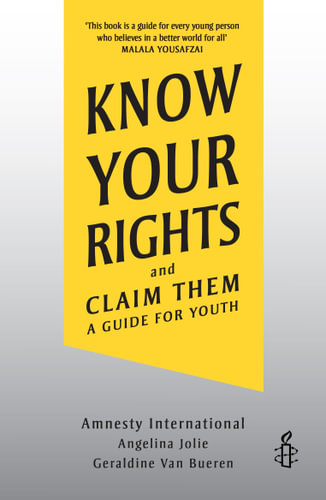Angelina Joile and Geraldine Van Bueren, Know Your Rights and Claim Them, A Guide for Youth, Walker Books, September 2021, 288 pp., RRP $18.99 (pbk), ISBN 9781839131196
Young people across the world are increasingly demanding that adults acknowledge that the world’s youth is entitled to a cleaner world and that serious and sustained action be taken to combat climate change. The right to a clean climate is one of the rights discussed in this book under the broader concept of life, dignity, and health. The book outlines some of the ‘rights of the child’ as laid down by the United Nations Convention on the Rights of the Child. As the book points out, these rights are not always respected. It is important for young people to know about their rights and how to claim them, so the book also gives advice about peaceful protest, about how to raise awareness in schools and communities and advice on how to protect themselves. Examples of rights violations are given, and they make moving reading.
Included in the book are some fascinating real-life stories about children and young people who have taken action and have fought for their rights. These young people have made a difference to their own lives and that of others. Babar Ali, for example, started a school in his backyard in West Bengal at the age of 9, teaching other children what he had learnt at school (p. 147) or Francia Simon who has helped many children in Dominican Republic to access education (p. 76). The courage of many of these young people is astounding. Two famous young activists, Malala Yousafzai and Greta Thunberg have written endorsements for the book.
The book includes an extensive list of sources of information, useful organisations which support child rights and a glossary of terms. The book is in English, and it would be interesting to know if there are plans for it to be translated. It is probably not the sort of book that is designed to be read right through but can be read in sections or on particular rights. It is certainly valuable in raising awareness among young people of their rights and why such rights matter. It would also be valuable in social science and history classes where rights, responsibilities, equality, and inequality are discussed.
Reviewed by Margot Hillel


